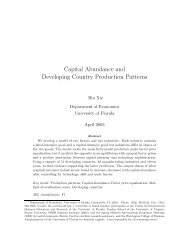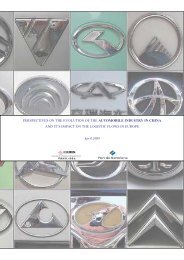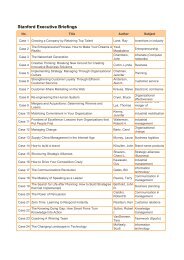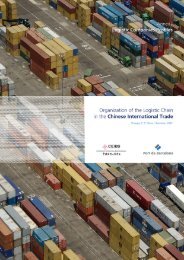Untitled - China Europe International Business School
Untitled - China Europe International Business School
Untitled - China Europe International Business School
Create successful ePaper yourself
Turn your PDF publications into a flip-book with our unique Google optimized e-Paper software.
Organization of the logistic chain in the Chinese international trade<br />
According to Mercer survey in 2002, 70% of multinational companies outsource logistics while only<br />
20% of domestic companies do. In general, Chinese companies still maintain a large number of<br />
logistics facilities which constitute a considerable proportion of their total assets. Chinese Government<br />
is strongly encouraging the outsourcing of logistics. The pressure to low cost is also a driver for<br />
companies to focus on core-business and outsource logistics.<br />
However there are still several constraints for domestic companies on the demand side:<br />
o Difficulty in coordinate if logistics activities come from different companies<br />
o Low methods to reduce operating costs and improve logistics efficiency<br />
o Difficulty to divest their low efficiency facilities and extra-personnel<br />
According to the last surveys about outsourcing logistics, the main reasons for not outsourcing are:<br />
o In-house capabilities still available<br />
o No confidence in service level of current logistic providers<br />
o Good providers not available<br />
II.I.7. Logistic Market Regulation<br />
<strong>China</strong>’s regulatory frame<br />
Numerous licenses and permits are required for Logistic companies to operate in <strong>China</strong>. Operating<br />
licenses and permits are provided by different ministries, provincial authorities and municipalities.<br />
Obtaining them can be time and resource consuming.<br />
The central government authorities involved are:<br />
• The Ministry of Communications (MOC) responsible for road and water transportation;<br />
• The Ministry of Railways, responsible for rail services;<br />
• The Ministry of Commerce (MOFCOM) (the former Ministry of foreign Trade and Economic<br />
Cooperation (MOFTEC) ) handling licenses for freight forwarding and other services;<br />
• The Civil Aviation Administration of <strong>China</strong> (CAAC) attending to aviation matters,<br />
• Customs for goods coming in and out of the country and<br />
• The State of Postal Bureau.<br />
The basic permits for foreign-invested international transportation joint venture enterprises to establish<br />
legal Entity (Joint venture) are:<br />
• Foreign Investment Enterprise Approval Certificate<br />
• <strong>International</strong> Freight forwarder Certificate (or “Class A License”)<br />
• <strong>Business</strong> License issued by State Administration for Industry and Commerce<br />
Companies also need to apply for key licenses depending on the activity. The operating licenses in<br />
<strong>China</strong> per service are:<br />
• Air cargo Agent permit<br />
• NVOOC registration certificate<br />
• Custom broker License<br />
• Custom Bonded/Supervised Warehouse license issued by Customs<br />
• Entrustment certificate for express services<br />
CEIBS Port of Barcelona Chair of Logistics 10










